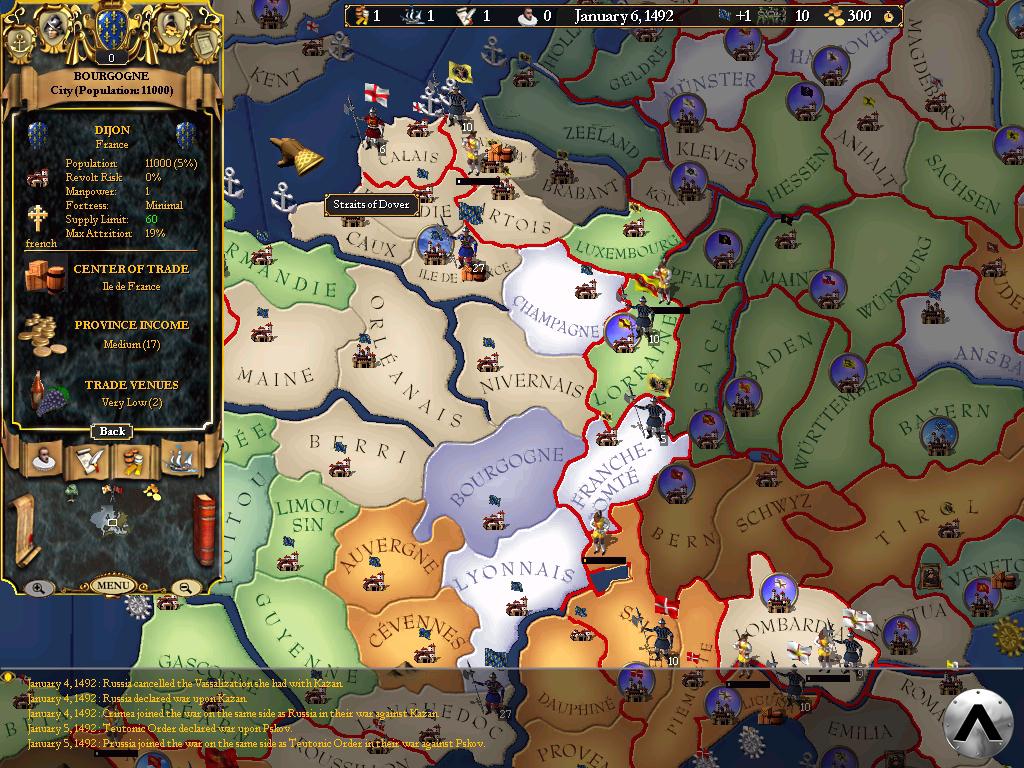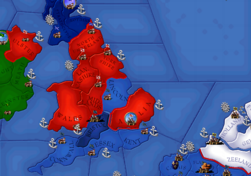March 17, 2004
 Europa Universalis
Europa Universalis
by peterbSince my last article was spent talking about console games and how great they are, let me shift gears and talk about a PC game I've been playing lately: Europa Universalis II.
This is a game with beautiful, beautiful maps. Gorgeous maps. Maps that literally take your breath away and make you marvel at them. You'll sit back, contemplating the intriguing position of the Low Countries in relation to the principality of Brandenburg, and say -- perhaps out loud, even -- "Damn that's one beautiful map." See, I like maps. I love them. And the tragedy of Europa Universalis, for me, is that the game isn't as good as its maps. I keep playing the game, even though I don't like it that much, because I'm convinced that it has to be better than it is. Because of the maps.At first blush EU II looks like a standard "conquer the world" civ-alike, perhaps with a feel akin to Merchant Prince, but it's really more of a history simulator than an actual game. It brings some interesting mechanisms to bear on the conquer-the-world genre that I enjoy on their own, yet which fail to cohere into a playable whole. Let's first take a look at some of these mechanisms by themselves, and about some of the positives of the game, and then talk about the negatives
Time Period
EU covers the period from 1419 through to the early 1800s. There are optional campaigns that cover smaller lengths of time, if you're not up for the full challenge of 400 years modeled a single day at a time. Yes, I said one day at a time. The days fly by, but this is not a game of lightning warfare and swift technological change; the sands of time drip through the hourglass one by one. I've been playing the "France 1492" campaign for perhaps two weeks now, and it's still only 1526. This is not a quick game.
Combat and Conquest
One of the aspects of the game which I intensely disliked when I started playing but have come to admire is how, exactly, conquest works. In your typical civ-alike (or Risk-alike), you march your troops off to some enemy province, dice are rolled, blood is spilled, and when all is said and done, to the victor goes the spoils. That's kind of how it works in EU II. But not really.
First, your invading army has to dispose of any standing troops in the province; that works pretty much like you'd expect. Then, you have to mount a siege. You can expect your average siege to take between 6 months to a year, or longer. Eventually, you'll starve the province into submission and the province is yours. Except it isn't: sure, you might have possession of that province, but if other leaders (and God!) don't recognize your claim to it, you are merely a pretender. No, if you want to claim that province you'll have to earn it the old fashioned way: by sending your best councillors off to negotiate peace, and getting the country you wrested the province from to agree to give it to you (unless the entire country is just a single province, in which case you may simply take it.)
This leads to hours of fun. So let's say you're France, and you want to assert your claim to Bretagne, which is owned by England. Sure, you can go conquer Bretagne, but you'll probably also send some troops to Britain to take over Cornwall and Kent, and beat up on British troops in the field for a year or so, in order to make the British desperate enough that they'll start suing for peace and be willing to part with Bretagne, and perhaps some lucre, too. My personal version of the Hundred Years War Part Deux ended with me in control of half of England, as well as the keys to their lovely colony of Massachussetts. Really, the British are quite tame once you've knocked down Buckingham Palace a few times.Raising a military is an expensive proposition, and you have to worry not only about taxes, but about support, attrition, and the disparity in technology levels between you and your opponent. It is challenging, if a bit unrealistically whack-a-mole like -- defeated armies "retreat" in seemingly random directions, sometimes deeper in to your own territory, so you have 16th century armies engaging in what seems like maneuver warfare, accidentally. It can be frustrating.
Religion
Provinces have religions (and cultures, too). Catholic, Orthodox, Protestant, Sunni, Shia, Buddhist, Hindu...all the major religions are represented (although not Zoroastrianism. Yea, verily, the Wise Lord Ahura Mazda shall punish the developers for their perfidy.) Religion is the backdrop against which politics moves throughout the years. It is more difficult to wage a war against a country that shares your religion (it damages the stability of your realm), and provinces of a different religion have a tendency to rebel more frequently (depending in part on how tolerant you decide to be of other religions). You can send missionaries around the world to convert the infidels.
Trade and Colonization
The game has a fairly opaque concept of "centers of trade" where your merchants compete for goods that I couldn't quite wrap my head around or enjoy. Colonization is expensive and takes forever, which makes sense, since it did in real life. You'll fight hostile natives (if there are any), plague (the game accurately models the dictum "Don't try to colonize subsaharan Africa, you idiot"), and the other great and not-so-great powers.
Exploration is a bit...strange. Put simply, you can't just go off into terra incognita and discover the world; you need a special army: an explorer (for seas) or a conquistador (for land). You can't buy them, find them, or hire them. You get one when the game decides to give you one; Spain and Portugal get plenty, early on, and everyone else gets few to none. This is part of what I mean when I describe the game as a "history simulator." There will be no alternate histories here (in the main game, at least) where France discovers the New World.
Hail, Mecklemburg!
One of the major changes from EU to EU II was the addition of the ability to play any country, not just the great powers. Want to play as Japan in 1419? You can do it. Brandenburg, Mecklemburg, or Tuscany? You got it. Playing the game as a tiny power has a very different feel from playing as a great power (it's the difference between "Can I conquer the world?" and "Can I survive the next two years?")
One of the things that recommends the EU series of games is: they're dirt cheap. You can get the original Europa Universalis for $5 on the remainder shelves of most big PC software chains, and EU II is going for around $10 to $15. That was, in fact, what convinced me to take a risk on it, and if I view my investment as "I spent $15 to get a really cool map of the world in the year 1500", it seems sensible to me.
The Downsides
The user interface is terrible. Of course it's clunky and unintuitive: it's a strategy game put out by a European software house, ergonomics in software are against the law there. More than that, it has a disturbing mouse-feel. By that I mean that the mouse tracking feels sloppy and inadequate, like they somehow misused DirectX and didn't get it right. At first I thought this was specific to the Mac version of the game, but I've since played on the PC and it's the same thing. I can't quite put it into words, but the mouse just doesn't move right. That makes the fact that the UI elements themselves are all undersized and not well marked that much worse.
The game is slow. No, slower than that. Glacially slow. Not in terms of how fast your pieces move, but just in terms of pacing. Obviously, some people like that in this class of game. I'm not saying it's an out-and-out negative, but it's a strange thing to say to yourself "OK, well, that was a good round of conquest. Now I'll watch the days go by one at a time for three years until my reputation improves."
The biggest negative of the game, for me, is that it fails to coalesce into something more than a toy; at times it feels more like Europa is playing you, rather than vice-versa. What is the game looking for? What inputs can I give it to make it happy? I admit that that is a vague description, but it's how I feel: I have fun looking at the game. I have fun thinking about the game. But I don't have all that much fun actually playing the game. I think the detailed After Action Reports on the publisher's forums by avid players attest to this: what's fun in Europa Universalis is, in large part, the mirror it holds up to the history buff's psyche, rather than the mechanisms and machinations of the game itself.
Additional Resources
Here are some links you can follow while you're thinking about how cool maps are:
- Greg Costikyan loves the game
- The EU forums are full of many tips from fans and fanatics.
- You can get the game at many places, including Amazon
Excerpt: I've finally gotten around to playing Europa Universalis 2 - I've owned the game for a good six months, but hadn't worked into the rotation. So far, I love it. Fun to play, beautiful to look at, the hours go...
Weblog: Funmurphys: the Blog
Tracked: March 19, 2004 01:49 PM
Please help support Tea Leaves by visiting our sponsors.

